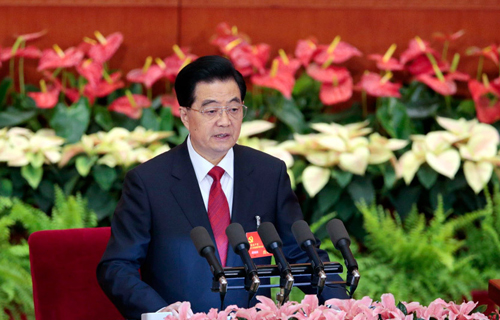'Moderately prosperous society' is key goal for China
- By John Ross
 0 Comment(s)
0 Comment(s) Print
Print E-mail China.org.cn, November 14, 2012
E-mail China.org.cn, November 14, 2012
 |
|
Hu Jintao, general secretary of the Central Committee of the Communist Party of China (CPC), makes a keynote report on behalf of the 17th CPC Central Committee during the opening ceremony of the 18th CPC National Congress at the Great Hall of the People in Beijing, on Nov. 8, 2012. |
The medium term target of creating a "moderately prosperous society", as set out at the Chinese Communist Party's 18th National Congress, is potentially a pivotal moment in China's development. It is not only an economic goal but can provide a sense of social cohesion and purpose that has sometimes been missing in recent years. Because it is so important it is therefore necessary to understand the implications of the goal, as set out in Hu Jintao's report to the Congress, and also to fully test its realism.
When China embarked on "reform and opening up" in 1978 it accepted that a certain development of inequality was inevitable. It meant understanding that the idea that society could be happy, and China undergo national revival, by equally "sharing out poverty" was an illusion. This understanding was summarized in Deng Xiaoping's famous statement "to be rich is glorious".
From an economic viewpoint this policy was entirely necessary. It is impossible to lift such an enormous society as China from a position of low income to prosperity in a uniform way. Unevenness was inevitable. After 1978 the coastal regions of China initially grew much more rapidly than the inland regions. Social inequality of wealth grew rapidly with the emergence of billionaires, while over 100 million people still lived on less than US$1.5 a day.
Such developments were inevitable but they also broke up the cohesion of society and, at worst, could produce a sense of cynicism – a type of "moral disintegration" of society. This is because to be "rich", in the real sense, is something possible only for a small minority in society – and to be a billionaire provides a perspective only for a few thousand people in China!
The goal of "moderately prosperous society" is different. To adapt Deng Xiaoping's famous statement, it might be phrased as "for society to be rich is glorious". This is not a criticism of Deng Xiaoping's original statement – as readers of this column know, no one is a greater admirer of Deng Xiaoping's economic policy than the present author. But Deng himself always stressed that policy must answer questions of today and must change with the times.
When China launched its economic reforms it was a poor society. Only a relatively small minority within it could attain the living standards of a developed economy. Today, after 34 years of economic growth, this has changed. The goal of "moderate prosperity", that is of a decent living standard, is within the grasp of all of China's population, no longer only a minority. Placing emphasis on the "richness" of society – that is on the tremendous transformations in housing conditions, wages, quality of household goods, holidays, cars, health, culture, entertainment that are implied by China becoming an advanced economy – can provide the social cohesion which can reintegrate society and overcome any moral vacuum.
When the most important numbers are regarded not as how many billionaires there are, but what is the average living space per person, what is the average income, how long are holidays, how many cinemas are there, how many people are on the internet, what is life expectancy, then social cohesion will increase and cynicism and moral emptiness decline. It is for this reason that the goal of a "moderately prosperous society" is so important not only for China's economy but for its development in every sense. Such achievements are also the key to China's international "soft power".
Nevertheless the foundation of the goal of a "moderately prosperous" society is economic. So, as the issue is so important, it is necessary to rigorously test the numbers put forward in the 18th Congress report. Fortunately this is relatively easily summarized.





